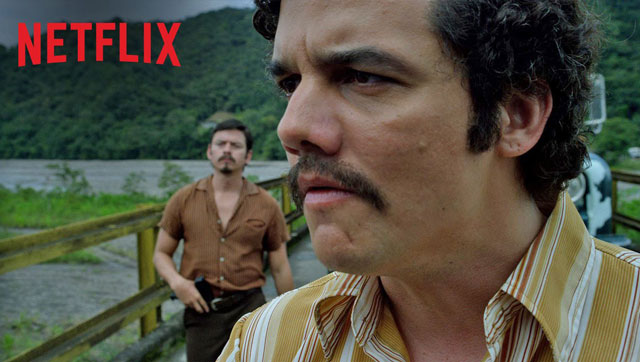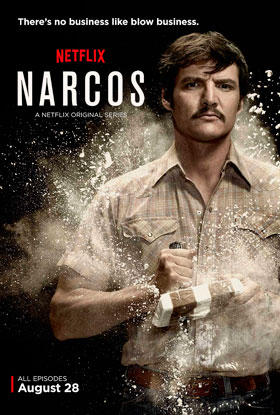
Netflix’s original programming is quickly becoming a better reason to subscribe to the video streaming service than the stash of months-old films and series it carries from other content producers. Its 2015 line-up has been consistently interesting, from the kooky delights of Unbreakable Kimmy Schmidt to the gritty action of Marvel’s Daredevil and the eccentricities of Sense8.
Now Narcos, a dramatisation of the war against Colombia’s Medellin cocaine cartel, confirms that Netflix can produce television drama that is as addictive, confident and ambitious as the best from HBO or AMC. It lacks the textured plotting of The Wire or the moral complexity of Breaking Bad, but Narcos is gripping, ballsy and epic enough to compensate for its relative lack of subtlety.
Narcos is as grand in scope as Netflix’s expensive misfire Marco Polo, but more successful. It takes in a panoramic view of how Pablo Escobar fathered the cocaine trade in the US and fanned the fires of America’s war on drugs throughout the 1980s and 1990s. It’s a shrewd slice of television that is salacious and educational at the same time — with just enough stylised sex and violence to qualify as a racy thriller and just enough reality to be a credible account of a strange and bloody chapter of modern history.
From episode one, Narcos wears its Martin Scorsese influence with pride. We’re introduced to the main players, including the Drug Enforcement Agency’s Steve Murphy, portrayed by Boyd Holbrook, and his partner, Javier Peña, played by Games of Thrones’ Pedro Pascal. Murphy’s narration guides us through a decade and a half of history as the show sprints to its conclusion.

His voiceover is a device for framing a complex tale that bounces from Pinochet’s Chile to Miami and Colombia, and which winds its ways from Colombia’s slums and jungles to the corridors of political power. It isn’t written with the psychological acuity and gangland poetry of Scorsese’s Goodfellas, but it’s effective and occasionally brings some wry humour into a dark story.
Much like The Wire or Steven Soderbergh’s Traffic, Narcos shows the drug war from multiple perspectives on both sides of the law. Dozens of characters enter the stage and then exit it, often violently — CIA agents, presidential candidates, street thugs, communist guerillas, judges and military chiefs. Yet the plotting is sharp enough that the huge cast and amount of ground Narcos covers never confuses.
Narcos is less interested in probing its character than it is in the tides of history and the failure of institutions, so the insights it offers into the motivations of Escobar and his pursuers aren’t particularly profound or original. Wagner Moura is chilling in his unshowy portrayal of the bumptious Escobar exactly because he plays him as a man rather than a monster.
Escobar, for him, is a dedicated family man and a ruthless brute, as capable of showing distress over the shooting of a dog as he is of ordering a jet full of innocent civilians to be blown up. Moura worked with Narcos’ Brazilian producer-director José Padilha in Elite Squad and its sequel; Narcos is sure to expose him to a wider international audience.
Pascal has charisma to burn as the streetwise but still idealistic Peña, and it’s also a treat to see Luis Guzmán in a sinister part rather than as a comical sidekick. Holbrook’s bland, blonde do-gooder is potentially the weak link, but he serves as an empathetic tour guide to the horrors of the Colombian drug trade for the viewer.
As with most retellings of real events, Narcos takes some liberties with the facts, but the broad strokes are true to life. The period detail is meticulous, with the sense of authenticity heightened by the liberal weaving of documentary footage of key events into the show’s tapestry. Narcos’ characters speak Spanish unless they’re speaking to the gringos, which also lends a little more credibility to the show.
As Murphy says in his omniscient narration, Escobar’s sensational story has the makings of magical realism, the literary tradition that is perhaps Colombia’s most famous export outside of cocaine and coffee. What makes Narcos so powerful, however, isn’t the larger-than-life figure of Escobar, but its forensic examination of the human weaknesses and institutional failures that allow men like him to thrive. — © 2015 NewsCentral Media



